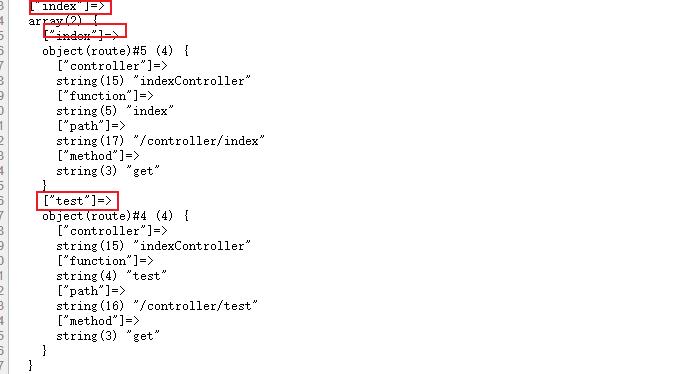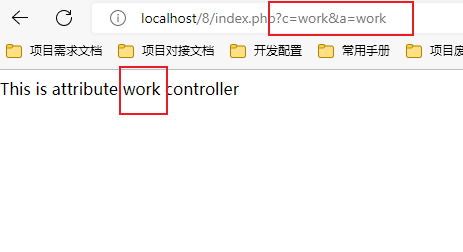php注解使用示例
<?php
class indexController
{
#[route('/controller/index','get')]
public function index():void
{
echo "This is attribute index controller \r\n";
} #[route('/controller/test','get')]
public function test():void
{
echo "This is attribute test controller \r\n";
}
}
<?php
class workController
{
#[route('/controller/work','post')]
public function work():void
{
echo "This is attribute work controller \r\n";
}
}
<?php
#[Attribute(Attribute::IS_REPEATABLE|Attribute::TARGET_METHOD)]
class route{ public static $all = []; public static $path = ''; public static $method = 'GET'; public static $function = ''; public static $controller = ''; public function __construct(){} public function setPath(string $path):self
{
$this->path = $path;
return $this;
} public function setMethod(string $method):self
{
$this->method = $method;
return $this;
} public function setFunction(string $function):self
{
$this->function = $function;
return $this;
} public function setController(string $controller):self
{
$this->controller = $controller;
return $this;
} public function addRoute():void
{
self::$all[str_replace("Controller","",$this->controller)][$this->function] = $this;
}
<?php
public static function setRoute($controllerClass){ $ref = new ReflectionClass($controllerClass);
$controller = $ref->getName();
$methods = $ref->getMethods(); foreach($methods as $method){
$function = $method->getName();
$attributes = $method->getAttributes(route::class); foreach($attributes as $attribute){ $route = $attribute->newInstance();
// 拿到注解上的参数
$params = $attribute->getArguments(); $route->setController($controller)
->setFunction($function)
->setPath($params[0])
->setMethod($params[1])
->addRoute();
}
}
}
}

<?php
class app{
public function appInit():self
{
if(glob("./controller/*.php")){
foreach(glob("./controller/*.php") as $fileName){
require_once($fileName);
$className = str_replace("./controller/","",str_replace(".php","",$fileName));
route::setRoute($className);
//route::$all;exit();
}
} return $this;
} public function run($config){
$controller = $_GET['c']??$config['default_controller'];
$action = $_GET['a']??$config['default_function']; if(isset(route::$all[$controller][$action])){
$route = route::$all[$controller][$action];
$className = $route->controller;
$function = $route->function;
(new $className)->$function();
}else{
exit("404 Not Found!");
}
}
}


<?php
$config = array(
'default_controller'=>'index',
'default_function'=>'index',
); return $config;

<?php
#[Attribute(Attribute::IS_REPEATABLE|Attribute::TARGET_METHOD)]
class route{ public static $all = []; public static $path = ''; public static $method = 'GET'; public static $function = ''; public static $controller = ''; public function __construct(){} public function setPath(string $path):self
{
$this->path = $path;
return $this;
} public function setMethod(string $method):self
{
$this->method = $method;
return $this;
} public function setFunction(string $function):self
{
$this->function = $function;
return $this;
} public function setController(string $controller):self
{
$this->controller = $controller;
return $this;
} public function addRoute():void
{
self::$all[str_replace("Controller","",$this->controller)][$this->function] = $this;
} public static function setRoute($controllerClass){ $ref = new ReflectionClass($controllerClass); $controller = $ref->getName(); $methods = $ref->getMethods(); foreach($methods as $method){
$function = $method->getName();
$attributes = $method->getAttributes(route::class); foreach($attributes as $attribute){ $route = $attribute->newInstance();
// 拿到注解上的参数
$params = $attribute->getArguments(); $route->setController($controller)
->setFunction($function)
->setPath($params[0])
->setMethod($params[1])
->addRoute();
}
}
}
}
<?php
class app{
public function appInit():self
{
if(glob("./controller/*.php")){
foreach(glob("./controller/*.php") as $fileName){
require_once($fileName);
$className = str_replace("./controller/","",str_replace(".php","",$fileName));
route::setRoute($className);
//route::$all;exit();
}
} return $this;
} public function run($config){
$controller = $_GET['c']??$config['default_controller'];
$action = $_GET['a']??$config['default_function']; if(isset(route::$all[$controller][$action])){
$route = route::$all[$controller][$action];
$className = $route->controller;
$function = $route->function;
(new $className)->$function();
}else{
exit("404 Not Found!");
}
}
}
<?php
class indexController
{
#[route('/controller/index','get')]
public function index():void
{
echo "This is attribute index controller \r\n";
} #[route('/controller/test','get')]
public function test():void
{
echo "This is attribute test controller \r\n";
}
}
<?php
class workController
{
#[route('/controller/work','post')]
public function work():void
{
echo "This is attribute work controller \r\n";
}
}
<?php
$config = array(
'default_controller'=>'index',
'default_function'=>'index',
); return $config;
<?php
require_once('./config.php');
require_once('./route.php');
require_once('./init.php'); (new app)->appInit()->run($config);
php注解使用示例的更多相关文章
- MyBatis3-基于注解的示例
在基于注解的示例中,可以简化编写XML的过程,全部采用注解方式进行编写,并在注解上写SQL语句,语句和XML的语句保持一致,并且可以省略掉XML文件不用引入的好处.但还有一点,基于注解的方式还没有百分 ...
- MyBatis多参数传递之注解方式示例--转
原文地址:http://legend2011.blog.51cto.com/3018495/1015003 若映射器中的方法只有一个参数,则在对应的SQL语句中,可以采用#{参数名}的方式来引用此参数 ...
- spring注解controller示例
依赖库 spring 3.0 配置web.xml文件如下: <?xml version="1.0" encoding="UTF-8"?> <w ...
- spring mvc 注解入门示例
web.xml <?xml version="1.0" encoding="UTF-8"?> <web-app xmlns:xsi=" ...
- Hibernate注解开发示例
-------------------------------------------------------------------customer------------------------- ...
- Spring 注解学习 详细代码示例
学习Sping注解,编写示例,最终整理成文章.如有错误,请指出. 该文章主要是针对新手的简单使用示例,讲述如何使用该注释,没有过多的原理解析. 已整理的注解请看右侧目录.写的示例代码也会在结尾附出. ...
- Spring bean依赖注入、bean的装配及相关注解
依赖注入 Spring主要提供以下两种方法用于依赖注入 基于属性Setter方法注入 基于构造方法注入 Setter方法注入 例子: public class Communication { priv ...
- 基于注解的SpringMVC
相比传统的继承Controller体系中某些类的方式,SpringMVC的注解具有以下优点: 1.Controller不再需要继承某个特定类,只是简单的POJO. 2.请求映射的配置非常方便灵活. 3 ...
- 【Java EE 学习 49 下】【Spring学习第一天】【MVC】【注解回顾】
一.MVC 1.使用Spring有一个非常大的好处,那就是能够实现完全面向接口编程,传统的使用Dao.Service并不能实现完全的面向接口编程. 2.示例:https://github.com/kd ...
随机推荐
- ipi发送阻塞导致crash
3.10的内核, 在子进程退出的时候,发送信号通知父进程,此时是持有父进程的sighand中的spinlock的,然后父进程和该子进程不在一个核上,发送ipi的reschedule中断给对应的核, 但 ...
- CAD二次开发---关于JoinEntity出现eNotApplicable的问题
作者在使用JoinEntity时出现eNotApplicable的问题,查阅了Autodesk论坛的相关帖子,发现大多数人都有遇到这个问题,但没有找到合适的解决方法,可能原因是进行Join时两Curv ...
- Downie for Mac最强视频下载工具(支持B站优酷土豆腾讯等)
我搜集到的一款简单拖放链接到Downie,它就会下载该网站上的视频.理论可以下载各种视频网站上的视频! 应用介绍 Downie 是一款Mac平台上的优秀视频下载软件,使用非常简单,只需将下载链接放置D ...
- Java源码分析 | CharSequence
本文基于 OracleJDK 11, HotSpot 虚拟机. CharSequence 定义 CharSequence 是 java.lang 包下的一个接口,是 char 值的可读序列, 即其本身 ...
- Html飞机大战(三):定义状态
好家伙, 1.为飞机大战定义状态 1.开始 START 有一个飞机大战LOGO &天空 2.开始时 STRATING 有一个飞机加载的界面&天空 3.运行时 RUNNING 我方飞机& ...
- python随机值生成的常用方法
一.随机整数1.包含上下限:[a, b] import random #1.随机整数:包含上下限:[a, b] for i in range(10): print(random.randint(0,5 ...
- KingbaseES R6 集群repmgr.conf参数'recovery'测试案例(二)
案例二:测试'recovery = automatic' 1.查看集群节点状态信息: [kingbase@node1 bin]$ ./repmgr cluster show ID | Name | R ...
- 手写tomcat——有线程池化能力的servlet 服务
点击查看代码 public class DiyTomcat { private int port = 8080; public static final HashMap<String, DiyS ...
- 【读书笔记】C#高级编程 第二十二章 安全性
(一)身份验证和授权 安全性的两个基本支柱是身份验证和授权.身份验证是标识用户的过程,授权在验证了所标识用户是否可以访问特性资源之后进行的. 1.标识和Principal 使用标识可以验证运行应用程序 ...
- jenkins流水线部署springboot应用到k8s集群(k3s+jenkins+gitee+maven+docker)(2)
前言:上篇已介绍了jenkins在k3s环境部署,本篇继续上篇讲述流水线构建部署流程 1.从gitlab上拉取代码步骤 在jenkins中,新建一个凭证:Manage Jenkins -> Ma ...
